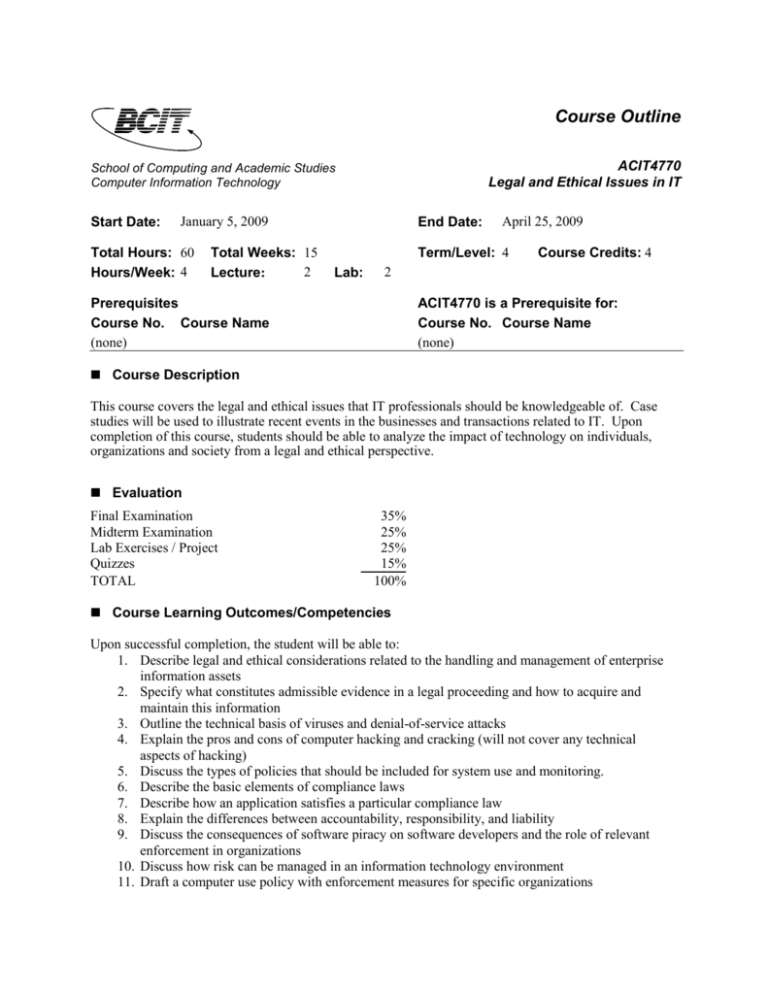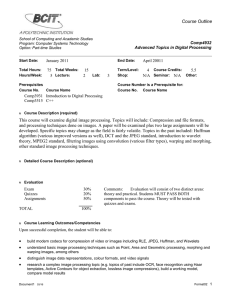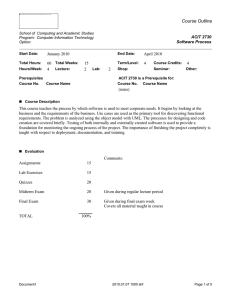
Course Outline
ACIT4770
Legal and Ethical Issues in IT
School of Computing and Academic Studies
Computer Information Technology
Start Date:
End Date:
January 5, 2009
Total Hours: 60
Hours/Week: 4
Total Weeks: 15
2
Lecture:
April 25, 2009
Term/Level: 4
Lab:
Course Credits: 4
2
Prerequisites
Course No. Course Name
(none)
ACIT4770 is a Prerequisite for:
Course No. Course Name
(none)
Course Description
This course covers the legal and ethical issues that IT professionals should be knowledgeable of. Case
studies will be used to illustrate recent events in the businesses and transactions related to IT. Upon
completion of this course, students should be able to analyze the impact of technology on individuals,
organizations and society from a legal and ethical perspective.
Evaluation
Final Examination
Midterm Examination
Lab Exercises / Project
Quizzes
TOTAL
35%
25%
25%
15%
100%
Course Learning Outcomes/Competencies
Upon successful completion, the student will be able to:
1. Describe legal and ethical considerations related to the handling and management of enterprise
information assets
2. Specify what constitutes admissible evidence in a legal proceeding and how to acquire and
maintain this information
3. Outline the technical basis of viruses and denial-of-service attacks
4. Explain the pros and cons of computer hacking and cracking (will not cover any technical
aspects of hacking)
5. Discuss the types of policies that should be included for system use and monitoring.
6. Describe the basic elements of compliance laws
7. Describe how an application satisfies a particular compliance law
8. Explain the differences between accountability, responsibility, and liability
9. Discuss the consequences of software piracy on software developers and the role of relevant
enforcement in organizations
10. Discuss how risk can be managed in an information technology environment
11. Draft a computer use policy with enforcement measures for specific organizations
Verification
I verify that the content of this course outline is current.
Chris Scholefield
December 15, 2008
Authoring Instructor
Date
I verify that this course outline has been reviewed.
Program Head/Chief Instructor
Date
Verification
I verify that this course outline complies with BCIT policy.
Dean/Associate Dean
Date
Note: Should changes be required to the content of this course outline, students will be given reasonable
notice.
Instructor(s)
Chris Scholefield
Office Location: SW2-131
Office Hrs.:
As posted
Office Phone:
604-432-8325
E-mail Address: chris_scholefield@bcit.ca
Learning Resources
Required:
A Gift of Fire – Social, legal and ethical issues for computers and the Internet (3rd Edition) Sara Baase.
Pearson Prentice Hall ISBN-10: 0136008488 | ISBN-13: 9780136008484
Recommended:
Ethics for the information age (3rd Edition) Mike Quinn
Pearson Prentice Hall SBN-10: 0321536851 | ISBN-13: 9780321536853
Information for Students
The following statements are in accordance with the BCIT Student Regulations Policy 5002. To review
the full policy, please refer to: http://www.bcit.ca/~presoff/5002.pdf.
Attendance/Illness:
In case of illness or other unavoidable cause of absence, the student must communicate as soon as
possible with his/her instructor or Program Head or Chief Instructor, indicating the reason for the
absence. Prolonged illness of three or more consecutive days must have a BCIT medical certificate sent to
the department. Excessive absence may result in failure or immediate withdrawal from the course or
program.
Academic Misconduct:
Violations of academic integrity, including dishonesty in assignments, examinations, or other academic
performances are prohibited and will be handled in accordance with the ‘Violations of Standards of
Conduct’ section of Policy 5002.
Attempts:
Students must successfully complete a course within a maximum of three attempts at the course. Students
with two attempts in a single course will be allowed to repeat the course only upon special written
permission from the Associate Dean. Students who have not successfully completed a course within three
attempts will not be eligible to graduate from their respective program.
Assignment and Quiz Details
There will be several assignments in this course. You are required to work in teams of three and submit
the group assignments. The assignments will cover the essentials of the various chapters. It is strongly
suggested that you work on those problems, master them, and then try different scenarios on your own to
reinforce the concepts. We will be discussing the assignment problems in the labs.
During the last 2 weeks of the course, we may be covering material for which there is not time to do an
assignment before the final exam. These concepts will be reviewed in the labs.
During lab period you will be given a short quiz. The quiz will test the material covered during the
previous week or so. In many cases the quiz will be taken directly out of the notes and textbook. The idea
is to encourage you to keep up with the course material. You must attend the lab to write the quiz and
every quiz will count toward your final mark.
Some of the quizzes will be done less formally during the lecture periods. You may be required to ask or
answer a question or to participate in some other classroom activity to receive credit for the quiz. These
activities will not be scheduled or announced in advance.
Schedule
Week of
Material Covered / Outcomes
References / Reading
1: Jan 5
Impact of technology on society
Origin and definition of law and ethics
Ch. 1
2: Jan 12
Privacy and personal information
Ch. 2
3: Jan 19
Canadian privacy legislation and obligations
Lecture notes
4: Jan 26
Creativity and freedom of expression
Ch 3
5: Feb 2
Encryption and interception
Ciphers, keys and authentication
Lecture notes
6: Feb 9
Intellectual property
Ch 4
7: Feb 16
Intellectual property (cont’d)
Mid Term Exam
Ch 4
8: Feb 23
Copyright and licensing
Ch 4
9: Mar 2
Crime, hacking, fraud, scams, viruses and jurisdiction
Ch 5
Spring Break (Mar 9)
10: Mar 16
Work environment, employee crime and monitoring
Ch 6
11: Mar 23
Evaluating and controlling technology
Ch 7
12: Mar 30
Errors, failures and risks
Ch 8
13: Apr 3
Liability, contracts and agreements
Lecture notes
14: Apr 13
Professional Ethics and responsibility
Ch 9
15: Apr 20
Final Exam







